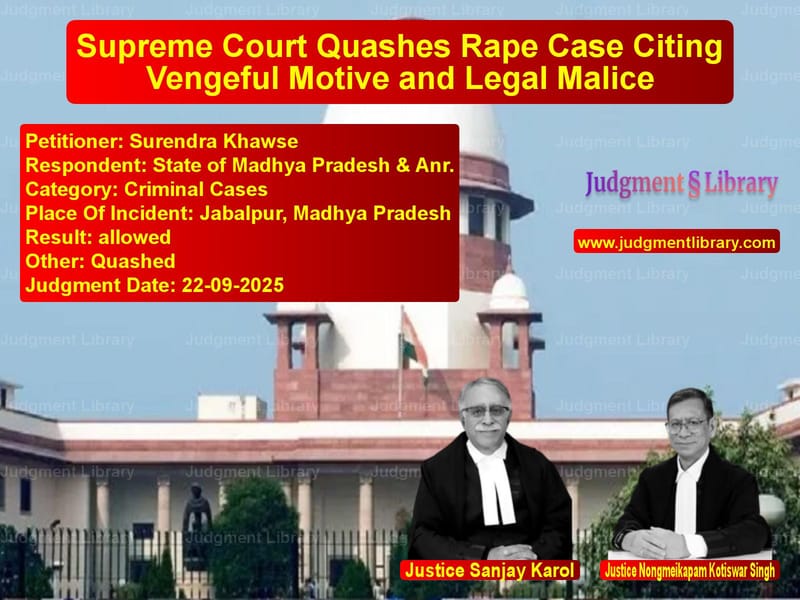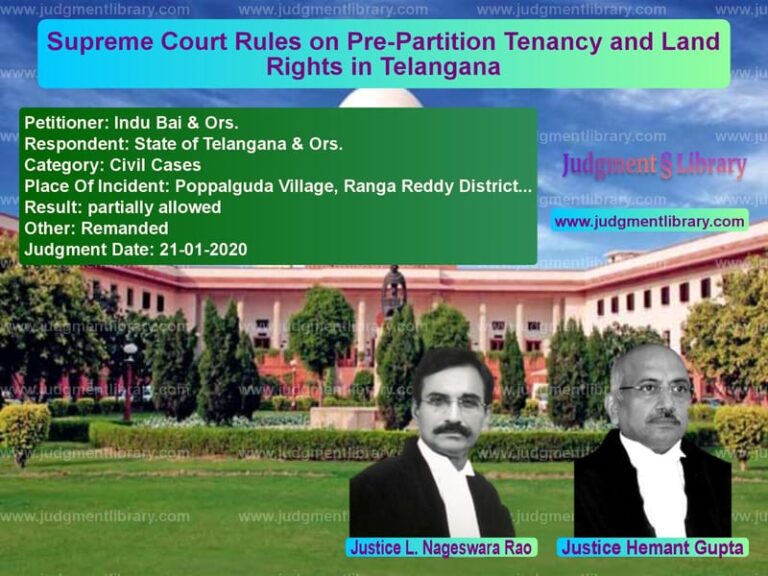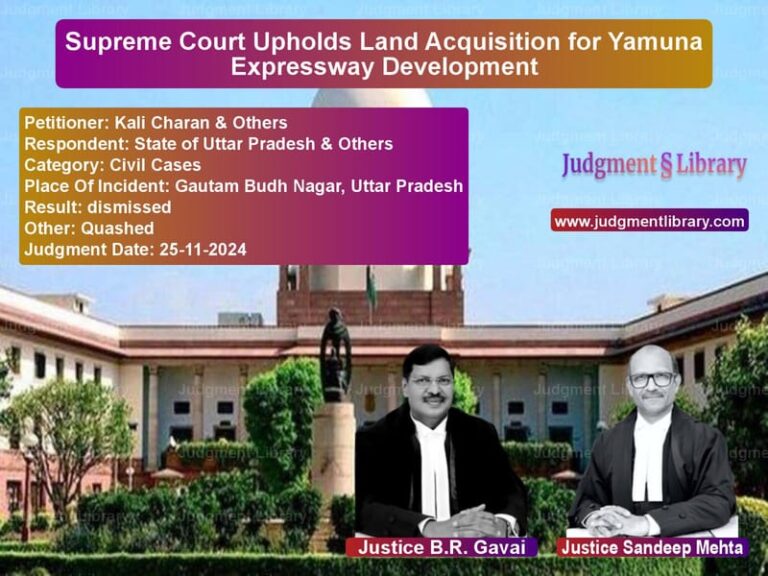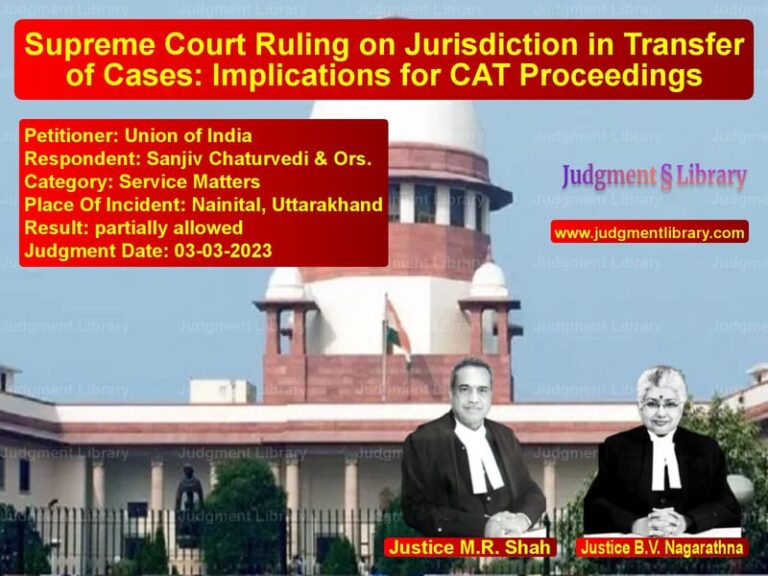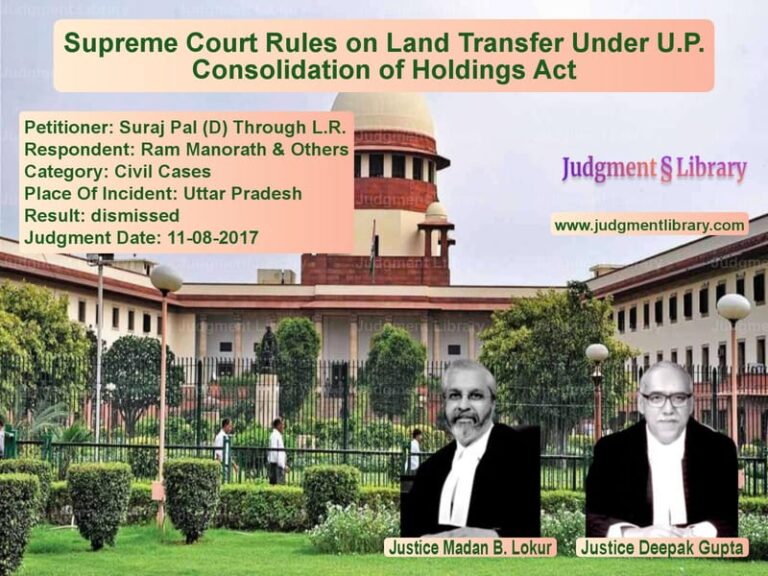Supreme Court Quashes Rape Case Citing Vengeful Motive and Legal Malice
In a landmark judgment that examines the fine line between genuine criminal complaints and those filed with ulterior motives, the Supreme Court of India recently delivered a significant ruling quashing a rape case filed under Sections 376 and 376(2)(n) of the Indian Penal Code. The case involved Surendra Khawse, an Assistant Revenue Inspector, and his female colleague who worked together at the Suhagi Municipal Corporation in Jabalpur, Madhya Pradesh.
The complex relationship between the two colleagues began as a professional association that gradually developed into a personal friendship and eventually progressed to physical intimacy. The complainant, a computer operator who was previously married and had a son from her marriage, alleged that Khawse had forced intimate relations with her on March 15, 2023, after office hours at his residence. According to her FIR, when she resisted his advances, he assured her of marriage and asked her not to worry. She claimed that this pattern continued until April 10, 2023, after which when she inquired about their marriage plans, Khawse refused and asked her to marry someone else instead.
However, what made this case particularly compelling was the sequence of events that unfolded before the FIR was registered. The relationship had soured significantly, leading Khawse to take legal and administrative actions against the complainant well before she filed the rape case. On April 24, 2023, Khawse filed a complaint under Section 155 of the CrPC before the Adhartaal Police Station in Jabalpur, alleging that the complainant, with whom he no longer wanted any relationship, repeatedly threatened to kill herself. He specifically mentioned that on the day he filed his complaint, she came to his residence, hurled abuses, and even consumed rat poison.
Khawse further escalated his complaints by writing to the Municipal Commissioner of Jabalpur on July 5, 2023, detailing the alleged harassment by the complainant and stating that her actions could force him to commit suicide. A similar complaint was submitted to the Divisional Officer of Nagar Nigam. These representations led to concrete administrative action against the complainant. The Municipal Corporation issued her a show-cause notice on July 6, 2023, asking her to rectify her behavior and submit clarification against Khawse’s allegations within 24 hours, with the explicit warning that failure to do so would result in her being relieved from employment.
The Supreme Court noted this crucial timeline: “It is to be noted that the FIR and chargeSheet which are the subject matter of the instant proceedings, are developments subsequent to the representations made by the Appellant-accused.” The Court emphasized that “the same was lodged four months after the alleged incident of forced sexual intercourse with the complainant.”
The High Court of Madhya Pradesh had earlier refused to quash the FIR, observing in its brief judgment: “5. At this stage, it cannot be said that there was false promise or not. It will be matter of evidence before the trial Court to decide the same. It will be too early to quash FIR on the said pretext. 6. Petition is dismissed.”
When the matter reached the Supreme Court, the bench comprising Justices Sanjay Karol and Nongmeikapam Kotiswar Singh carefully examined the circumstances surrounding the case. The Court delved deep into the legal principles governing the quashing of criminal proceedings, particularly referencing the landmark case of State of Haryana v. Bhajan Lal, which established specific circumstances where courts can exercise their inherent powers to quash FIRs.
The Supreme Court made several crucial observations about the timing and motivation behind the FIR. The judges noted: “If the description of the offence is taken at face value, right at the first instance, the complainant was not willing and was persuaded to engage in relations on the assurance of eventual marriage between the parties. When she enquired as to when the same would take place, a few days later, allegedly the Appellant-accused refused and asked her to marry someone else. That would be the first occasion when, having realized that she had been taken advantage of the complainant should have taken the requisite action.”
The Court further observed: “Even if that was not done so, the fact that the subject FIR was only lodged after the issuance of show-cause notice, which obviously has large real-world implications insofar as the complainant is concerned, leaves open a gaping possibility that the same was lodged as an afterthought and was a vehicle for vengeance for the impending consequences described above.”
In its detailed analysis, the Supreme Court referred to one of the specific factors mentioned in the Bhajan Lal case that justifies quashing criminal proceedings: “(7) Where a criminal proceeding is manifestly attended with mala fide and/or where the proceeding is maliciously instituted with an ulterior motive for wreaking vengeance on the accused and with a view to spite him due to private and personal grudge.”
The judgment also extensively quoted from Mohd. Wajid v. State of U.P., where the Court had elaborated on how to handle cases potentially filed with ulterior motives: “36. At this stage, we would like to observe something important. Whenever an accused comes before the Court invoking either the inherent powers under Section 482 of the Code of Criminal Procedure (CrPC) or extraordinary jurisdiction under Article 226 of the Constitution to get the FIR or the criminal proceedings quashed essentially on the ground that such proceedings are manifestly frivolous or vexatious or instituted with the ulterior motive for wreaking vengeance, then in such circumstances the Court owes a duty to look into the FIR with care and a little more closely.”
The Court further emphasized: “37. We say so because once the complainant decides to proceed against the accused with an ulterior motive for wreaking personal vengeance, etc. then he would ensure that the FIR/complaint is very well drafted with all the necessary pleadings. The complainant would ensure that the averments made in the FIR/complaint are such that they disclose the necessary ingredients to constitute the alleged offence. Therefore, it will not be just enough for the Court to look into the averments made in the FIR/complaint alone for the purpose of ascertaining whether the necessary ingredients to constitute the alleged offence are disclosed or not.”
Most significantly, the Supreme Court outlined the broader responsibility of courts in such matters: “38. In frivolous or vexatious proceedings, the Court owes a duty to look into many other attending circumstances emerging from the record of the case over and above the averments and, if need be, with due care and circumspection try to read in between the lines. The Court while exercising its jurisdiction under Section 482CrPC or Article 226 of the Constitution need not restrict itself only to the stage of a case but is empowered to take into account the overall circumstances leading to the initiation/registration of the case as well as the materials collected in the course of investigation…”
Applying these principles to the present case, the Supreme Court concluded that the circumstances clearly indicated the FIR was filed with an ulterior motive. The sequence of events – Khawse’s complaints against the complainant, the show-cause notice issued to her by their employer, and the subsequent filing of the rape case – created a compelling narrative of retaliatory legal action rather than a genuine pursuit of justice.
The Court’s ruling highlights an important aspect of criminal jurisprudence – the need to distinguish between bona fide complaints and those filed as instruments of vengeance. While the judiciary must always be sensitive to genuine victims of sexual offenses, it also has a responsibility to prevent the misuse of legal processes for settling personal scores.
This judgment serves as a significant precedent in cases where the timing of FIR registration and the surrounding circumstances raise serious questions about the complainant’s motives. It reinforces the principle that courts must look beyond the mere allegations in an FIR and examine the broader context, including the relationship between the parties, the sequence of events, and any potential ulterior motives that might have prompted the legal action.
The Supreme Court’s decision to quash the FIR and chargesheet underscores the judiciary’s role as a guardian against the abuse of legal processes while simultaneously ensuring that genuine victims continue to have access to justice. This balanced approach is crucial in maintaining public confidence in the criminal justice system and protecting individuals from malicious prosecutions that can have devastating consequences on their personal and professional lives.
Petitioner Name: Surendra Khawse.Respondent Name: State of Madhya Pradesh & Anr..Judgment By: Justice Sanjay Karol, Justice Nongmeikapam Kotiswar Singh.Place Of Incident: Jabalpur, Madhya Pradesh.Judgment Date: 22-09-2025.Result: allowed.
Don’t miss out on the full details! Download the complete judgment in PDF format below and gain valuable insights instantly!
Download Judgment: surendra-khawse-vs-state-of-madhya-prad-supreme-court-of-india-judgment-dated-22-09-2025.pdf
Directly Download Judgment: Directly download this Judgment
See all petitions in Fraud and Forgery
See all petitions in Extortion and Blackmail
See all petitions in Legal Malpractice
See all petitions in Other Cases
See all petitions in Judgment by Sanjay Karol
See all petitions in Judgment by N. Kotiswar Singh
See all petitions in allowed
See all petitions in Quashed
See all petitions in supreme court of India judgments September 2025
See all petitions in 2025 judgments
See all posts in Criminal Cases Category
See all allowed petitions in Criminal Cases Category
See all Dismissed petitions in Criminal Cases Category
See all partially allowed petitions in Criminal Cases Category

